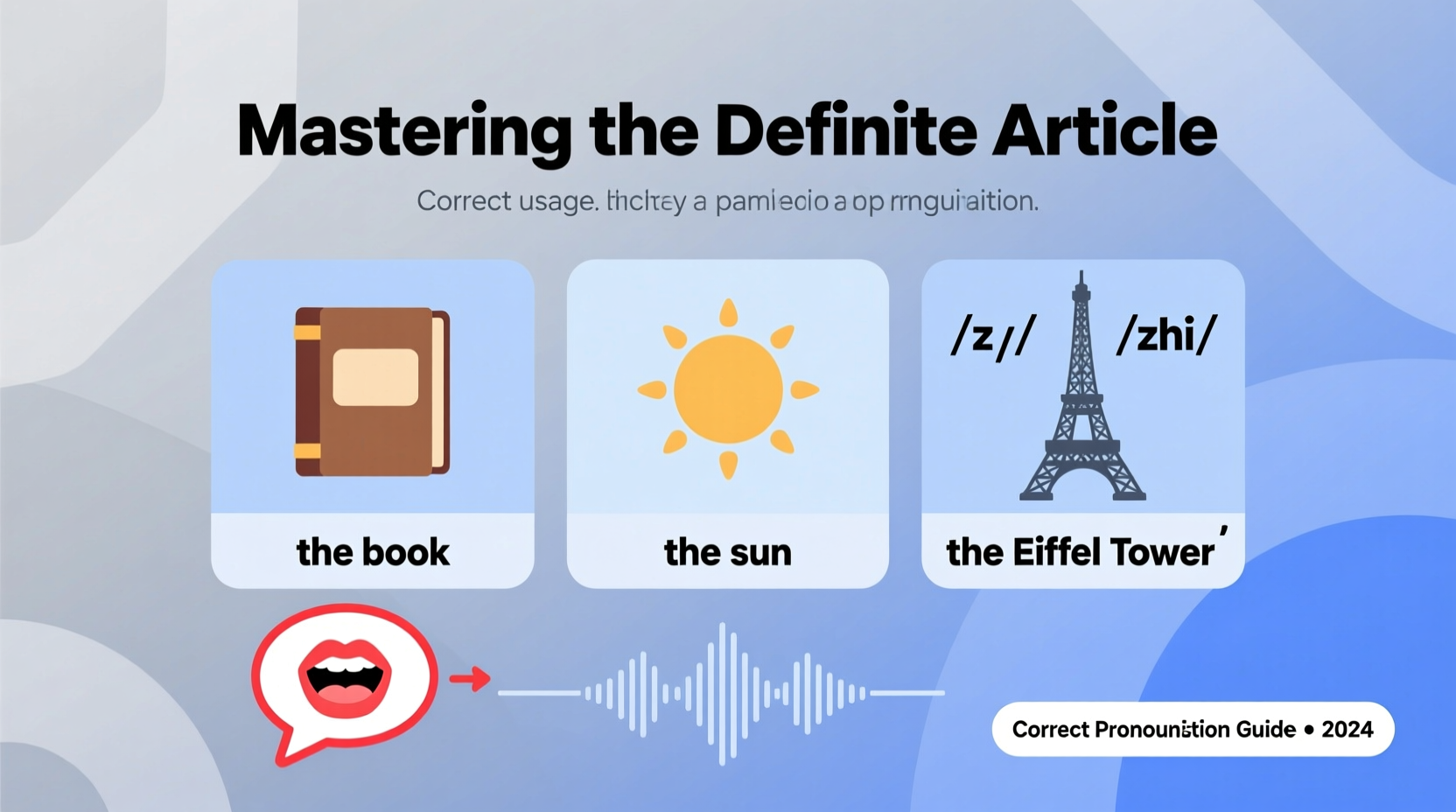The word “the” may appear simple—just three letters, one syllable—but it is the most frequently used word in the English language. Despite its ubiquity, many learners and even native speakers mispronounce or misuse it depending on context. Mastering the correct pronunciation and usage of “the” is essential for clear, natural-sounding speech. This guide breaks down when and how to say “the” with precision, offering linguistic insights, practical rules, and real-world applications.
Understanding the Two Pronunciations of \"The\"

The word “the” has two standard pronunciations:
- “Thee” (/ðiː/) – used before words beginning with a vowel sound.
- “Thuh” (/ðə/) – used before words beginning with a consonant sound.
This distinction is not arbitrary; it follows phonetic principles designed to make speech smoother and more fluid. The voiced “th” sound in “the” naturally flows into vowel sounds, so the elongated “thee” form prevents awkward pauses or glottal stops.
“Pronunciation isn’t just about correctness—it’s about rhythm and ease in spoken language. Using ‘thee’ before vowels maintains the flow of conversation.” — Dr. Lydia Chen, Phonetics Researcher, University of Edinburgh
When to Use \"Thee\" vs. \"Thuh\": A Practical Guide
The key lies in identifying the initial sound of the following word—not its spelling. Below is a breakdown of common patterns.
| Following Word Starts With | Pronunciation | Example | Phonetic Breakdown |
|---|---|---|---|
| Vowel sound (a, e, i, o, u) | Thee (/ðiː/) | the apple, the hour, the umbrella | /ðiː ˈæpəl/, /ðiː ˈaʊər/, /ðiː ʌmˈbrɛlə/ |
| Consonant sound (b, c, d, etc.) | Thuh (/ðə/) | the book, the car, the dog | /ðə bʊk/, /ðə kɑːr/, /ðə dɒɡ/ |
| Words starting with silent 'h' | Thee (/ðiː/) | the honor, the heir, the honest person | /ðiː ˈɒnər/, /ðiː ɛər/, /ðiː ˈɒnɪst/ |
| Words starting with 'u' pronounced as /juː/ | Thuh (/ðə/) | the university, the European, the useful tool | /ðə ˌjuːnɪˈvɜːrsɪti/, /ðə ˌjʊərəˈpiːən/, /ðə ˈjuːsfl/ |
| Acronyms beginning with vowel sounds | Thee (/ðiː/) | the FBI, the UN, the EU | /ðiː ˌef.biːˈaɪ/, /ðiː juːˈen/, /ðiː ˌiːˈjuː/ |
Common Missteps and Corrections
- Mistake: Saying “thuh hour” → Correction: “thee hour” (silent ‘h’, vowel sound).
- Mistake: Saying “thee yellow car” → Correction: “thuh yellow car” (/j/ is a consonant glide).
- Mistake: Saying “thuh MBA” → Correction: “thee MBA” (M is pronounced /em/, which starts with a vowel sound).
Step-by-Step Guide to Mastering \"The\" in Speech
- Identify the next word. Look at the word immediately following “the.”
- Determine its first sound. Ask: Does it start with a vowel sound or a consonant sound?
- Choose the correct pronunciation:
- If vowel sound → use “thee” (/ðiː/)
- If consonant sound → use “thuh” (/ðə/)
- Practice in context. Read sentences aloud using both forms.
- Record yourself. Compare your pronunciation to native speakers via podcasts or audiobooks.
- Review exceptions. Pay special attention to silent letters and acronyms.
Real Example: A Learner's Journey
Carlos, an advanced ESL student from Colombia, consistently used “thuh” before all instances of “the.” During a presentation on climate change, he said, “thuh environment is under threat,” which sounded unnatural to his professor. After being corrected, Carlos practiced with a list of target words like “environment,” “honesty,” and “EU funding.” He recorded himself daily and used shadowing techniques with BBC news clips. Within three weeks, his pronunciation became significantly more fluent, and his confidence in professional settings improved.
This case illustrates that while small, the correct use of “the” impacts perceived fluency and credibility in spoken English.
Checklist: Mastering \"The\" in 7 Steps
- ☐ I can distinguish between vowel and consonant sounds at word beginnings.
- ☐ I know to say “thee” before words like “apple,” “hour,” and “FBI.”
- ☐ I use “thuh” before words like “book,” “yellow,” and “European.”
- ☐ I remember silent 'h' makes a word begin with a vowel sound.
- ☐ I apply the rule to acronyms based on their pronunciation, not spelling.
- ☐ I’ve practiced reading aloud with varied examples.
- ☐ I’ve recorded myself and compared my speech to native models.
FAQ: Common Questions About \"The\"
Why does “the” have two pronunciations?
The dual pronunciation exists to ease articulation. Using “thee” before vowel sounds avoids a glottal stop or awkward blending, making speech more fluid. It’s a feature of connected speech in English phonology.
Is it wrong to always say “thuh”?
In casual speech, overusing “thuh” may go unnoticed, but in formal contexts—presentations, teaching, broadcasting—it can mark non-nativeness or lack of attention to detail. For clarity and professionalism, mastering both forms is recommended.
What about poetic or emphatic use of “thee”?
Yes—in poetry, drama, or for emphasis, speakers may use “thee” (/ðiː/) even before consonants to stress a noun: “This is thee moment we’ve waited for.” This is stylistic, not grammatical, and conveys importance or drama.
Conclusion: Speak with Precision and Confidence
Mastering the definitive article is not about pedantry—it’s about precision. The way you pronounce “the” subtly signals your command of English rhythm and sound patterns. Whether you're giving a speech, teaching a class, or simply conversing, getting this small word right enhances your overall intelligibility and fluency. These habits compound over time, leading to more natural, confident communication.









 浙公网安备
33010002000092号
浙公网安备
33010002000092号 浙B2-20120091-4
浙B2-20120091-4
Comments
No comments yet. Why don't you start the discussion?